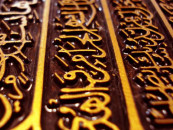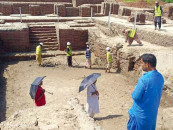English: a colonial legacy or relic?
We have always adopted an oxymoronic attitude towards English

The locale is the subcontinent under the yoke of the East India Company. Owing to the presence of gora saheb bahadur and the interaction of these English speaking intruders with the naive local community, the fidget of imitating the spoken English was turning into a fetish.
In this setting, two local wrestlers, rather call them pehalwans to relish the cultural undertones, are carried away with the craze of speaking English. They were all ears whenever they heard a gora interacting with the natives.
After much travail, they become able to speak pidgin English. But there develops a rivalry between the two to outwit each other with their newly acquired ‘expertise’ in English.
One day, one friend throws down the gauntlet and asks the other friend to tell the English equivalent for agar-batti. The other in a jiffy blurts out ‘if thirty-two’. The former himself not knowing the exact translation of the word accepts the answer as his defeat but nurtures in his heart the William Blake’s poison tree against his friend.
Now their meetings thin out. One day, when they come across each other in the vegetable market, without exchanging their usual courtesies, the first friend thinking of taking revenge challenges the other one again. This time, he changes his stratagem and asks his friend to translate ‘misunderstand’ into Urdu. The latter smirks victoriously and utters ‘Miss neechay khari’. The twice-vanquished friend gulps down his anguish of defeat and moves away mute.
Being a pehalwan, he doesn’t yield to his defeat meekishly. He gets obsessed with taking revenge on his friend. Then one day, he challenges his friend to have a wrestling match, ostensibly to salve his piqued ego. Actually, he wanted to insult his friend with a heavy blow in front of people. The other friend, however, sees through his friend’s nefarious intentions.
On the day of the match, the hitherto victorious friend offers the other to play a language translation match instead of the wrestling match. The begrudged friend welcomes the offer and darts a self-made sentence: Uss ne kaam kiya hey, kiya hey, kiya hey. Out comes the triumphant reply from the two-time victor: He has done his work and dn dna dn dnn, dna dn dnn. These vocables sound the rhythmic beat of a drum played in the wrestling arena when a wrestler wins in Punjab.
The same holds true in our caricature English medium schools. Neither the teacher nor the students have the slightest notion what is being taught and learnt. In the blind pursuit of English, our students particularly of early classes even fail to understand the questions of their textbooks. They are coerced to do their studies parrot-fashion. Cognition of Urdu and native languages has been hit the hardest all along.
Actually, we have always adopted an oxymoronic attitude towards English. We have neither embraced it wholeheartedly nor rid ourselves of it completely. One government makes it an official language while the other overturns the decision declaring it our colonial legacy.
We have not been successful in making Urdu our official language either, despite required by our Constitution and ordered by the Supreme Court in its verdict in September 2015. India adopts English as its co-official language, and this sagacious policy has paid it dividends in science and technology.
No-one can deny the currency of English, which reaches its highest value now in a world of artificial intelligence. But without the provision of prerequisites of trained teachers, tailor-made curriculum, and enabling milieu, the adventurism with the instruction of English is proving counterproductive, making English the bete noir of our students.
Where below 4% of the national budget is allocated to education, the low standard of English pedagogy is no surprise at all. Global educationists demand a linguistic tax be imposed on the native speakers of English to help minimise the linguistic injustice being meted out to non-native learners of English.
Published in The Express Tribune, January 20th, 2024.
Like Opinion & Editorial on Facebook, follow @ETOpEd on Twitter to receive all updates on all our daily pieces.



1678954829-0/ipiccy_image-(37)1678954829-0-100x90.webp)








1704177126-4/SRKfanspiece24-(1)1704177126-4-208x130.webp)








1724319076-0/Untitled-design-(5)1724319076-0-208x130.webp)

COMMENTS (4)
Comments are moderated and generally will be posted if they are on-topic and not abusive.
For more information, please see our Comments FAQ